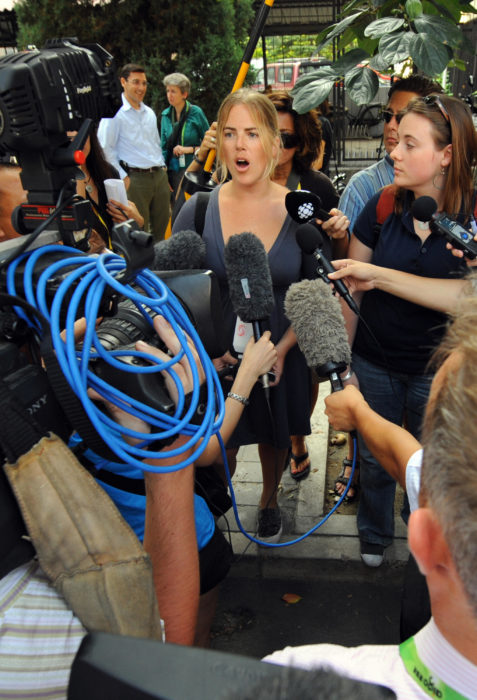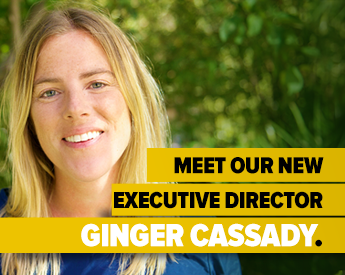We are very excited to announce that Ginger Cassady is the new Executive Director at Rainforest Action Network.
Ginger’s appointment follows the decision of former Executive Director Lindsey Allen to step down after ten incredible years with the organization. Following an extensive national search process, Ginger will be assuming the role on March 2, 2020.
Ginger has been a driving force behind many of RAN’s successful campaigns. She played a key role in achieving the largest legal victory against an oil company in history when Chevron was found liable for polluting the Amazon. Under her direction, the international team at RAN has grown into a powerful force in the global effort to keep forests standing, uphold human rights and protect our climate. She led her team against some of the biggest drivers of deforestation in Indonesia — including pushing some of the world’s largest banks, commodity traders, producers and consumer goods companies to change their policies and stop driving deforestation.
From traveling by canoe through the roadless Amazon, to convening with activists on the frontlines fighting deforestation and rights abuses in Southeast Asia, to participating in high profile acts of civil disobedience in Washington DC, to being on point in high-level negotiations with some of the biggest corporations on the planet, Ginger comes with an almost incomparable track record of experience, commitment and success.

Prior to joining RAN in 2010, Ginger served as a Campaign Director at Forest Ethics and was a Senior Campaigner at Greenpeace USA. She has spearheaded bold campaigns challenging deforestation from the Boreal forests to the Brazilian Amazon. She helped create and is the Board President of Amazon Frontlines, a cutting edge, frontline organization providing direct solidarity with Indigenous communities in the Ecuadorian Amazon in their fight for land rights. Ginger has also dedicated years of support to the movement for Tibetan liberation and served on the Board of Directors for Students for a Free Tibet and supported the development of Tibet Action Institute.
Throughout her career, Ginger has consistently lifted up the voices of young women leaders and prioritized the central importance of upholding Indigenous land rights.
Just after she was named as the new executive director, we sat down with Ginger for a question and answer session to hear more about her vision for this critical work going forward.
Q&A Questions:
1) What makes you most excited about taking the helm at RAN? What is unique and special about RAN?
RAN has always been one of the most effective and groundbreaking campaigning organizations out there. Again and again, RAN has changed the game by tackling the worst corporations driving deforestation, resource extraction and human rights violations. I am so excited at this opportunity to build and evolve this impactful work.
The ultimate goal of RAN campaigns is not simply to shift individual targets but to shift the practices of entire industrial sectors. When we negotiate with corporations, we are demanding not only environmental protections but also the recognition of, and respect for, human and Indigenous rights. And the reason we can do this is because we build and maintain authentic and effective partnerships with local and frontline communities and their allies across the globe. These are the communities directly impacted by our corporate targets — and we couldn’t do this work without them.
RAN has also been a leader in pushing the financial sector for greater accountability. That means: we follow the money. And we have been exposing the major financial players behind fossil fuel expansion and deforestation. For too long, these powerful global players were allowed to profit with impunity from the consequences of their business decisions. But we have been peeling back that veil and forcing real change.
2) After more than 30 years of action and growth, RAN seems to be in a healthy and strong place as an organization. What is your vision for where the organization needs to go from here?
The alarming reality is that we are facing an unprecedented ecological and societal catastrophe. We have to make major, society-wide, systemic changes — and we have very little time to do it. Everybody’s goal should be preventing mass extinction and preserving a livable world for future generations.
And I believe people are ready to take on this challenge. Everyday we hear from people wanting to take bigger risks and bolder actions, because they know we have to confront these challenges. And RAN is perfectly positioned to help direct that people power.
My vision of RAN is that of a key player in a coordinated, collaborative global movement that centers Indigenos leadership, challenges corrupt corporate power and protects biodiversity and intact landscapes.
3) You have led many teams and campaigns over the past 20 years. How would you describe your leadership philosophy?
I have a deep dedication to learning from others. I have been fortunate enough to work with some of the most committed and brilliant leaders in this arena. And I deeply believe in the common sense truth that the most effective, most long lasting and most ethical way to protect forest ecosystems is to stand up for the rights of the Indigenous and frontline communities. They have been stewarding these lands for generations, and they need to be at any decision-making table.
That is essentially the core belief behind my activism: That fighting for environmental protection and a sustainable future is inextricable from the fight for global social justice and racial equity. It’s the same fight. And the world will be better served with more strong women in positions of power. That’s an imbalance that needs correcting — and that correction is long overdue. We need to support more young women to step into decision making roles across the nonprofit world, but also in government and corporate realms as well.
4) “Keep Forests Standing” — that is a core part of RAN’s mission and programs. What does that mean to you, and how will RAN keep forests standing in 2020 and beyond?
2020 is a critical year. We know that any real solution to the climate crisis needs to include the protection of forests. At RAN, we are expanding our focus globally, while continuing our core work in Indonesia. We will be targeting some of the most influential multinational brands and banks which are pouring billions of dollars into the industries responsible for driving deforestation. We are conducting research right now and investigating those companies that are complicit in deforestation and human rights abuses. And we will make doing business with those companies untenable.
We know our allies are ready and eager to ramp up this work. And we are excited to work with them and mobilize real people power. We will let corporations know that they must move beyond paper promises and take real action now. We have extracted dozens of commitments from massive global companies to end deforestation. And we are going to make sure they keep their word.
5) There is growing public awareness around the climate catastrophe we are facing. What is RAN’s role in the fight to protect our climate?
RAN’s climate and energy program is having a huge impact. Last year, in our 10th annual Banking on Climate Change report, we identified Chase Bank as the world’s worst funder of climate change. And we launched an ambitious campaign to pressure Wall Street’s biggest bank to turn off the spigot of billions of dollars a year flowing to the fossil fuel industry. Our report is now the data of record — our figures are being cited in major news sources almost daily across the globe. That’s because our research and methodology are of the highest quality and our analysis is incisive.
Our campaign has now scaled into a movement. Hundreds of people have been arrested, thousands have taken action at Chase branches across the country and millions have learned about the primary role Chase and Wall Street banks play in perpetuating the climate crisis. We are actively changing the global conversation about the responsibility major financial institutions have to stop financing the destruction of our planet. This is a movement that can transform the inner workings of our global economy to achieve a just transition to a green energy future!
At the same time, we must make sure that the connection between our forests and the climate is not lost. As the world is waking up to the critical importance of defunding fossil fuels, we have to realize that keeping forests standing is just as important. And to keep forests standing, we must uphold Indigenous rights, and support strong and organized local and Indigenous communities. We must stand with communities in their fight to gain legal rights to their land and ensure their ability to protect and manage it –– sustaining their ways of life and safeguarding the vast majority of the world’s biodiversity from extinction. It is all connected. It is all the same fight.
Community resistance has stopped new pipelines from being built, new coal plants from being developed, and new areas of forest from being cut down. By supporting these movements, we can slow the worst impacts of climate change.
Collectively, we can challenge corporate power and win.
6) You have been involved in countless bold actions and high profile corporate accountability campaigns. Do you have a favorite protest story or campaign victory that stands out as particularly satisfying or exciting?
I was honored to participate in the global swarm of actions surrounding the 2008 Team Tibet Chinese Olympics campaign. A savvy and bold team of dozens of Tibetans and supporters infiltrated China and conducted an escalating series of creative, provocative and attention grabbing public direct actions that caught the attention of the world and exposed China’s brutal, authoritarian abuses taking place in Tibet. I will never forget the electric energy on the streets of Beijing and the excitement of taking part in those daring protests.
7) You’re a campaign strategist, a fundraiser and a movement leader — but what are some joys and other pursuits in your life?
I enjoy anything outdoors — and particularly in the ocean. I live on a houseboat floating in the San Francisco Bay. If I’m not paddling around my house you will find me hiking or surfing along our beautiful coast line or snowboarding up in the mountains. It’s such a privilege to have a job that allows me to protect this beautiful world that I love so much.
